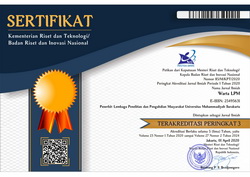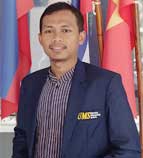Pengelolaan Sampah Berbasis Masyarakat sebagai Upaya Mewujudkan Kota Layak Huni di Kelurahan Bulusan Tembalang Semarang
DOI:
https://doi.org/10.23917/warta.v25i2.648Keywords:
waste management, community-based, liveable cityAbstract
The increasing of population number influences waste generation so that it requires proper management to prevent the environmental problems. Waste management will determine the level of environment quality as well as the amenities. This is in accordance with the concept of a livable city, particularly related to the provision of urban facilities. Hence, it is necessary to have an understanding of the concept of a livable city as a form of the government's commitment to improving the quality of the environment and society. The community service team is from the Laboratory of Urban Design and Development, Department of Urban and Regional Planning, Universitas Diponegoro that consist of four lecturers and two students disseminated the concept of a livable city in Bulusan Village through community-based waste management. This is done as an effort to reduce the volume of waste which requires an active role and community commitment. The purpose of this dissemination is to increase public understanding and ultimately realize the importance of playing a role in its implementation. The method used in this activity were identified potentions and problems on waste management, identified the community’s characteristics and analyzed existing waste management, that further arranged the waste management strategies in term of liveable city. The data collection process is carried out through interviews and field observations. The output of this community service is a community-based waste management strategy within the framework of the livable city concept based on lessons learned from best practices and relevant theories through the involvement of students, boarding house owners, and the community in waste sorting, the role of government in bridging with garbage collectors.
Downloads
References
Ambarwati, & Darnoto, S. (2017). Pakom Daur Ulang Sampah Anorganik di Desa Ngadirejo, Kartasura, Sukoharjo. Warta LPM, 20(2), 83–93.
Asis, M. M. B., & Liao, K. A. S. (2018). Enriching Journeys: Transnational Temporary Migration Between the Philippines and Europe. 59–80. https://doi.org/10.1007/978-3-319-61258-4_4
Astuti, D., Muharram, J. U., & Listiana, Y. (2018). Pembentukan Bank Sampah di Kebayanan-I Desa Puron Kecamatan Bulu Kabupaten Sukoharjo. Warta LPM, 21(2), 96–102. https://doi.org/10.23917/warta.v21i2.5320
Chinasho, A. (2015). Review on Community Based Municipal Solid Waste Management and Its Implication For Climate Change Mitigation. American Journal of Scientific and Industrial Research, 6(3), 41–46. https://doi.org/10.5251/ajsir.2015.6.3.41.46
Christiawan, P. I. (2018). Membangun Perilaku Sadar Ekologis dan Ekonomis Ibu Rumah Tangga melalui Reorientasi Pemanfaatan Sampah Perumahan di BTN Banyuning Indah. Warta LPM, 21(2), 79–89. https://doi.org/10.23917/warta.v21i2.5018
Debrah, J. K., Vidal, D. G., & Dinis, M. A. P. (2021). Raising Awareness On Solid Waste Management Through Formal Education for Sustainability: A Developing Countries Evidence Review. Recycling, 6(1), 1–21. https://doi.org/10.3390/recycling6010006
Fabula, S., Boros, L., Kovács, Z., Horváth, D., & Pál, V. (2017). Studentification, Diversity and Social Cohesion in Post-Socialist Budapest. Hungarian Geographical Bulletin, 66(2), 157–173. https://doi.org/10.15201/hungeobull.66.2.5
Heidari, A., Kolahi, M., Behravesh, N., Ghorbanyon, M., Ehsanmansh, F., Hashemolhosini, N., & Zanganeh, F. (2018). Youth and Sustainable Waste Management: A SEM Approach and Extended Theory of Planned Behavior. Journal of Material Cycles and Waste Management, 20(4), 2041–2053. https://doi.org/10.1007/s10163-018-0754-1
Herdiansyah, H., Saiya, H. G., Afkarina, K. I. I., & Indra, T. L. (2021). Coastal Community Perspective, Waste Density, and Spatial Area Toward Sustainable Waste Management (Case Study: Ambon Bay, Indonesia). Sustainability (Switzerland), 13(19). https://doi.org/10.3390/su131910947
Hubbard, P. (2008). Regulating the Social Impacts of Studentification: A Loughborough Case Study. Environment and Planning A, 40(2), 323–341. https://doi.org/10.1068/a396
Iyengar, R., & Shin, H. (2020). Community-Based Programs to Tackle Environmental Education and COVID-19: A Case Study from Millburn, New Jersey. Prospects, (0123456789). https://doi.org/10.1007/s11125-020-09467-0
Pemerintah Kota Semarang. Rencana Pembangunan Jangka Menengah Kota Semarang Tahun Plan 2016-2021. , Pub. L. No. Peraturan Daerah Kota Semarang No 6 Tahun 2016 (2016).
Pemerintah Kota Semarang. Rencana Tata Ruang Wilayah Kota Semarang Tahun 2011-2031. , Pub. L. No. Peraturan Daerah Kota Semarang No 5 Tahun 2021 (2021).
Pemerintah Republik Indonesia. Pengelolaan Sampah. , Pub. L. No. Undang-undang No 18 Tahun 2008 (2008).
Priyono, K. D., Harismah, K., & Qomarun, Q. (2020). Diseminasi Teknologi Energi Terbarukan Berbasis Sampah Sayuran untuk Mendukung Desa Wisata Alam Desa Selo Boyolali. Warta LPM, 23(2), 151–164. https://doi.org/10.23917/warta.v23i2.9727
Samadikun, B. P., Sudibyakto, Setiawan, B., & Rijanta. (2014). Dampak Perkembangan Kawasan Pendidikan di Tembalang Semarang Jawa Tengah ( The Impact Development of Education Area in Tembalang Semarang Jawa Tengah ) Program Studi Geografi dan Ilmu lingkungan , Jurusan Geografi Lingkungan , Jurusan Teknik Arsitektur da. 21(3), 366–376.
Sekito, T., Prayogo, T. B., Dote, Y., Yoshitake, T., & Bagus, I. (2013). Influence of A Community-Based Waste Management System On People’s Behavior and Waste Reduction. Resources, Conservation and Recycling, 72, 84–90. https://doi.org/10.1016/j.resconrec.2013.01.001
Sinthumule, N. I., & Mkumbuzi, S. H. (2019). Participation in Community-Based Solid Waste. Resources, 8(30), 1–16. https://doi.org/10.3390/resources8010030
Wahyono, S., & Sahwan, F. L. (2013). Pengelolaan Sampah Berbasis Masyarakat di Rawasari , Kelurahan Cempaka Putih Timur ,. 13(1), 75–84.
Downloads
Submitted
Published
How to Cite
Issue
Section
License
Copyright (c) 2022 Warta LPM

This work is licensed under a Creative Commons Attribution 4.0 International License.















